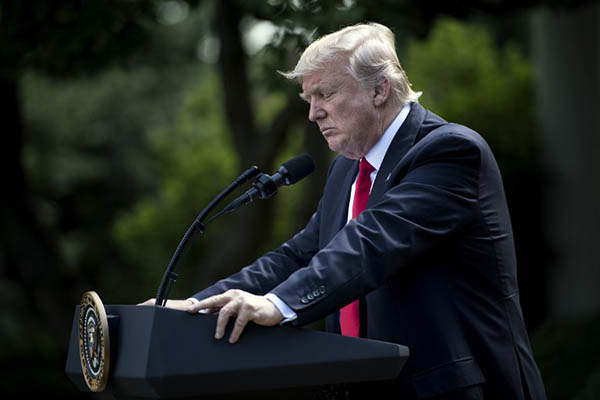
Brendan Smialowski—AFP
Former secretary of state John Kerry says Donald Trump’s decision has isolated the U.S. from the rest of the world
President Donald Trump’s dramatic decision to pull out of the 195-nation Paris climate accord deals a dramatic blow to U.S. world leadership and international cooperation.
Amid shock that the world’s richest economy had turned its back on a deal seen by many as the last best hope of slowing global warming, other nations promised to step up. But Washington’s superpower shoes will be hard to fill, and Trump’s decision will further alienate an already nervous Europe and a suspicious China.
The United States never ratified a previous climate agreement, the 1997 Kyoto Protocol, undercutting its credibility and power to effectively curtail carbon emissions. But when the world met again in 2015 to build a more ambitious accord, the then U.S. administration of Barack Obama championed an ambitious stance.
U.S. diplomatic and economic muscle was vital in getting emerging powers and growing polluters like India on board—and on striking a deal with China. Secretary of State John Kerry was on hand on Dec. 12, 2015 to shepherd the hotly debated text through to agreement in Paris at an emotional ceremony. And in April 2016 he sat with his granddaughter on his knee at the United Nations to join every other country in the world save Syria and Nicaragua in signing on.
On Thursday, Kerry was furious at the damage he feels the U.S. pullout will do to the planet and future generations—but also at the blow to American prestige. “This is an unprecedented forfeiture of American leadership,” he declared in a statement from his office at the Carnegie Endowment. Trump’s decision, he warned, “will cost us influence, cost us jobs, and invite other countries to walk away from solving humanity’s most existential crisis. It isolates the United States after we had united the world.”
The first signs of that new isolation were not long in coming. France, Germany and Italy issued an immediate statement dismissing Trump’s vague offer to negotiate a new accord with better guarantees for U.S. industry. The European Commission moved to secure the abandoned leadership of the climate change fight to Brussels, pledging that the world “can count on Europe.” And a spokesman for United Nations Secretary General Antonio Guterres expressed “major disappointment.”
“It is crucial that the United States remains a leader on environmental issues,” said the official, Stephane Dujarric. But the ease with which Trump shrugged off U.S. commitments that took months of hard effort to agree on reflects a weakness in Obama and Kerry’s victory.
While they managed to persuade India, China and other emerging giants to sign on to the deal, they knew they would never get the U.S. Senate to ratify it. The consensus deal that they sought was not, therefore, a treaty that bound their successors. In effect, the accord rested on Washington maintaining faith.
Trump, in step with much of the Republican Party and large numbers of voters, was already skeptical of any measures that would restrict traditional U.S. industry. But his White House also includes those such as influential strategy chief Steve Bannon, who reject any notion of international oversight on U.S. governance.
Observers quickly saw the fingerprints of Bannon—a self-declared “economic nationalist”—on Trump’s speech tearing up the accord. Trump alleged that the rest of the world had applauded the Paris deal for “the simple reason that it put our country … at a very, very big economic disadvantage.”
“Foreign leaders in Europe, Asia and across the world should not have more to say with respect to the U.S. economy than our own citizens and their elected representatives. Thus our withdrawal from the agreement represents a reassertion of America’s sovereignty,” he declared, to applause from his senior team.
This is in line with Trump’s criticisms of the NATO alliance and the NAFTA free trade zone, or his withdrawal from the Trans-Pacific Partnership talks. His “America First” vision, as outlined by former oil executive Secretary of State Rex Tillerson, puts U.S. job creation ahead of building foreign partnerships. But the better trade deals Trump says he wants to pursue will require winning the trust of bruised foreign leaders—and may include clauses on environmental regulation.
And if Washington won’t lead, who will?
“The Trump Administration has said its primary economic interest is in jobs, innovation and competitiveness,” said Richard Morningstar, former U.S. ambassador to the E.U. and now director of the Global Energy Center at the Atlantic Council. “By this action we are ceding leadership on climate and new technologies to China and Europe,” he said, warning: “The president’s decision to withdraw from Paris is a huge mistake. There is no upside.” And, as Samantha Gross of the Brookings Institute warned: “Our withdrawal also opens up a geopolitical space in climate leadership that may or may not be filled.”
